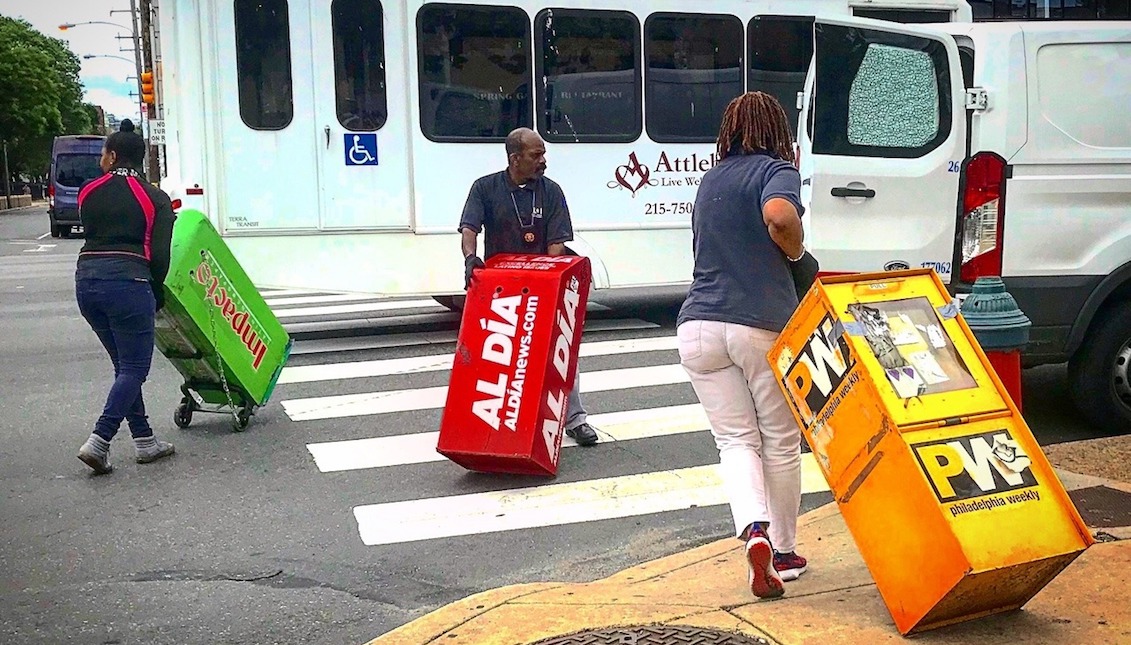
Journalism's Double Battle with the Coronavirus: How will we survive this pandemic?
The COVID-19 crisis is the biggest story in decades, yet the media will not have funds to cover it.
From the Cuomo brothers' phenomenon to the president's incongruous press conferences, journalism in the United States seems to be experiencing a deep identity crisis.
At a time when information is critical to saving millions of lives, the media faces, on the one hand, the uphill battle of covering a second-by-second changing epidemic; on the other hand, the side effect of the public health crisis on the economy.
As public spaces close, journalists across the country are being fired at the same rate as other employees, while companies face aggressive cuts in advertising sales in both print and digital media.
"Things are going to be very difficult for journalists," Tom Gibson, the lead advocate of the Committee to Protect Journalists (CPJ) in Brussels told EUobserver. He added that the "role of the journalist will be critical" in the pandemic in providing access to reliable, high-quality information.
Gibson said certain elements that already made life in journalism difficult have been compounded by the pandemic, such as being in a weak economic sector, working in isolated conditions and in some cases, like Hungary, being under attack from officials.
"They have an important role as a watchdog, giving citizens information, pushing governments on transparency in terms of measures, commitments they made," Gibson added.
Outlets such as Portland Mercury, The Stranger, and BuzzFeed have all announced measures to cut their staffing levels, including reducing the salaries of their employees by 25%, Buzzfeed CEO Jonah Peretti told USA Today.
“We don’t know how long this will last, but we want to move quickly to make sure our business remains sustainable,” Peretti wrote in a memo to staff.
Last week, Gannett, which owns USA Today and more than 250 local newspapers, told employees that it would begin "a series of immediate cost reductions," including a break program in its news division in April, May, and June, as a result of economic pressures brought on by the pandemic. CEO Paul Bascobert told employees, "I will not accept any pay until these leave and pay reductions have been reversed.”
Other publishers such as McClatchy, Lee Enterprises and Tribune are also struggling with debt that is impossible to pay off under the current circumstances.
Depending on community networks for their livelihood, small newsrooms across the country are being muzzled by something worse than censorship: the closure of the grassroots economy.
RELATED CONTENT
With no advertising revenue from local businesses and the cancellation of public events, the future of smaller format print publications now depends on a dizzying –and often hampered– transformation to digital that would otherwise have taken months.
According to the New York Times, new media that started out as online publications have found the crisis a golden opportunity:
"Those outlets draw most of their revenue from subscriptions or donations, rather than from ads for local businesses, and the urgent news articles of recent weeks have attracted readers willing to pay for news,” the media explains.
According to a ComScore study of more than a dozen general news websites, since the outbreak of the Coronavirus pandemic, "the number of minutes readers spend on news sites increased by 46 percent over the same period ending a few days ago last year, and overall visits increased by 57 percent.”
However, competing in this new scenario against media such as Politico, The Atlantic, The Los Angeles Times and The New York Times itself, is a battle of David against Goliath.
While giants like Facebook seem to be giving a boost to the local newspaper industry, with an injection of up to $100 million to "bring the world closer", the reality is that it is precisely the monopolization of information that has strangled our small ecosystem.
"From protecting our democracy to keeping those in authority held accountable and in this current state, combating a pandemic sweeping our globe, the news has always been there for us and yet big tech continues to fail it,” wrote John Stanton, former head of BuzzFeed's DC office, and co-founder of the Save Journalism Project.
“While Google, Apple, and Facebook have always been the villain behind news outlets’ demise, this pandemic is exacerbating and inflaming newspapers’ reality — newspapers, despite their heroic reporting, are being starved of its rightfully earned money and it’s all in the numbers.”
"If we want to come out of this crisis united, we must encourage a thriving news industry and that starts with donating and supporting your local newsrooms,” he concluded. "As a community of consumers, who desperately rely on this reporting, we must save the fourth estate or else a future crisis will go unreported.”











LEAVE A COMMENT:
Join the discussion! Leave a comment.